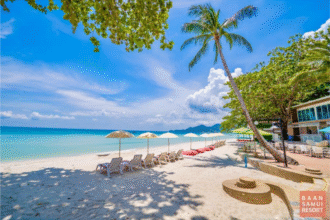Bangkok has long been one of Southeast Asia’s most dynamic real estate markets, attracting investors seeking both strong rental yields and long-term capital growth. The city’s combination of modern infrastructure, expanding mass transit systems, and vibrant lifestyle has made it a top choice for foreign buyers.
As we step into 2025, many international investors are asking the same question: Are Bangkok Properties still a good investment this year?
The answer is not as simple as a “yes” or “no.” Market conditions, changing buyer preferences, and evolving government policies all play crucial roles. This comprehensive guide explores the state of Bangkok’s property market in 2025, providing valuable insights for foreign buyers looking to make an informed decision.
Bangkok’s Property Market Outlook in 2025
The real estate sector in Bangkok has shown resilience over the past few years, despite global economic uncertainties. According to recent reports, the Greater Bangkok area has experienced a surge in buyer demand in early 2025, driven by both domestic and international investors. This renewed confidence can be attributed to several key factors:
- Improving Economic Conditions – Thailand’s GDP growth is projected to stabilize at around 3–4%, boosting consumer confidence and encouraging investment in residential properties.
- Expansion of Infrastructure – Ongoing mass transit expansions, including the MRT Orange Line and the BTS extensions, are pushing property values higher in prime and emerging neighborhoods.
- Rising Expatriate Demand – Bangkok continues to attract professionals, digital nomads, and retirees, creating sustained demand for high-quality rental properties.
For investors wondering whether it’s the right time to buy, these positive indicators suggest that Bangkok remains a promising market. For more details on the city’s current property demand, see the latest insights on Bangkok Properties.
Why Bangkok Properties Continue to Attract Foreign Investors
1. Competitive Pricing Compared to Other Asian Cities
When compared to markets like Singapore, Hong Kong, or Tokyo, Bangkok offers significantly more affordable entry points for luxury properties. Prime condominiums in Bangkok’s CBD typically range between THB 250,000 to THB 500,000 per square meter, while similar properties in Singapore can cost three to four times more.
This pricing advantage, combined with the city’s modern amenities, makes Bangkok an attractive alternative for investors who want a foothold in Asia without the premium price tag.
2. High Rental Demand from Expats
Bangkok’s thriving business districts, international schools, and world-class healthcare facilities attract a steady flow of expatriates. These professionals often prefer renting rather than buying, creating strong rental demand for centrally located condominiums.
Typical rental yields for one-bedroom units in prime areas such as Sukhumvit, Sathorn, and Asoke range from 3% to 5% annually, with smaller units offering higher returns due to strong demand among single professionals.
3. Diverse Investment Options
Investors are not limited to high-end condominiums. Mid-range developments in emerging neighborhoods along new MRT and BTS lines are gaining popularity, offering better rental yields and strong capital growth potential over time.
Key Market Trends to Watch in 2025
Understanding the latest trends will help investors make smarter decisions when purchasing Bangkok Properties this year.
Shift Towards Sustainable and Smart Living
Developers are increasingly incorporating eco-friendly designs, energy-efficient systems, and smart home technology into new projects. Buyers who prioritize sustainability are willing to pay a premium for these features, boosting both resale and rental appeal.
Rising Demand in Secondary CBDs
While traditional CBD areas such as Silom and Ploenchit remain attractive, secondary business districts like Rama IX and Bang Sue are gaining traction due to improved transport connectivity and lower property prices.
Increase in Foreign Buyer Interest
Chinese, Japanese, and Singaporean investors remain dominant in Bangkok’s property market. However, 2025 has also seen growing interest from Middle Eastern and European buyers, particularly in luxury and branded residences.
Stronger Resale Market
With limited new land supply in the CBD, resale properties in prime locations are seeing higher demand, especially those within walking distance to mass transit stations.
Legal Considerations for Foreign Buyers in Bangkok
Thailand’s property laws remain foreign-investor-friendly, especially for condominium ownership. However, it’s essential to understand the legal framework before purchasing.
What Foreigners Can Own
- Condominiums: Foreigners can own up to 49% of the total sellable area in a condominium project.
- Houses and Land: Direct land ownership is restricted, but foreigners can lease land for up to 30 years or own the building (not the land) under specific conditions.
Essential Legal Steps
- Foreign Exchange Transaction Form (FETF) – Required to prove that funds were transferred from abroad.
- Title Deed Verification – Always verify the Chanote title (ownership certificate) to avoid legal disputes.
- Due Diligence and Legal Review – Engage a qualified property lawyer to review contracts and ensure compliance with Thai law.
Areas to Consider for Investment in Bangkok
1. Sukhumvit
Still the most popular choice for expatriates, Sukhumvit offers a mix of luxury and mid-range condominiums, international schools, and lifestyle amenities.
2. Sathorn and Silom
Bangkok’s financial hub remains a solid choice for investors targeting professionals who work in multinational offices.
3. Rama IX and Ratchada
Emerging as a new CBD, Rama IX offers lower entry prices and high potential for future appreciation.
4. Bang Sue
With the new high-speed rail hub and mixed-use developments, Bang Sue is becoming one of Bangkok’s fastest-growing property markets.
Risks and Challenges to Consider Buying a Property in Bangkok
While Bangkok remains a promising market, investors should be aware of potential challenges:
- Currency Fluctuations – Exchange rate changes can impact the actual cost of investment for foreign buyers.
- Oversupply in Certain Segments – Mid-range condominiums in non-CBD areas sometimes face oversupply, leading to slower rental absorption.
- High Competition in Luxury Market – Ultra-luxury units in prime CBDs have limited buyer pools, which can affect resale liquidity.
Careful market research and choosing the right project can help mitigate these risks.
Practical Tips for Foreign Investors in 2025
Work with reputable developers
A developer’s track record is one of the most critical factors for your investment’s security. Established firms have a brand and reputation to protect, making them far more likely to deliver projects on time, use high-quality materials as advertised, and honor warranties. In contrast, new or unproven developers can pose risks of significant delays, substandard construction, or even project abandonment, leaving you with a costly legal battle instead of a new home.
Consider professional property management
If you are an absentee owner, managing a property from another country is a logistical nightmare. A professional management company acts as your on-the-ground representative, handling everything from tenant screening and rent collection to emergency repairs at 3 a.m. and navigating local rental laws. The fee is a small price to pay for peace of mind, ensuring your asset is protected and generating steady income without constant stress.
Stay updated on market trends
Real estate markets are not static; they are constantly influenced by economic factors, new infrastructure projects, and policy changes. By actively monitoring local real estate news, price-per-square-meter reports, and rental yield data, you can better identify if it’s a buyer’s or seller’s market. This knowledge empowers you to negotiate more effectively and to time your purchase to maximize your potential for capital appreciation rather than buying at the peak of a price bubble.
Inspect the property
This is a non-negotiable step. Marketing photos and virtual tours can be deceiving and will never reveal potential issues like poor craftsmanship, signs of water damage, or unexpected noise from the surroundings. If you cannot visit in person, hire a certified independent inspector or a highly trusted agent to conduct a thorough walkthrough on your behalf, complete with detailed photos and videos. This small upfront cost can save you from discovering expensive, hidden problems after the deal is closed.

Are Bangkok Properties Still a Good Investment in 2025?
The short answer is yes—Bangkok remains a solid investment destination in 2025, particularly for condominiums in prime or well-connected areas. Strong rental demand, competitive prices, and ongoing infrastructure development continue to support the city’s property market.
However, success depends on choosing the right location, understanding legal requirements, and having a long-term investment perspective.
If you are ready to explore the market further, check out the latest market analysis on Bangkok Properties for updated insights. You can also browse in-depth guides and property listings at Bangkok Properties to discover the best opportunities for 2025.
With careful planning and the right strategy, your investment in Bangkok could be both profitable and rewarding.







